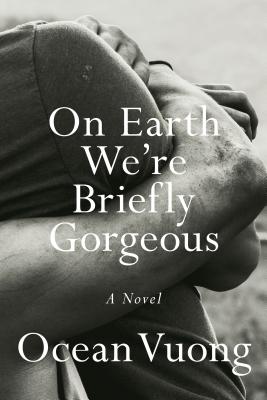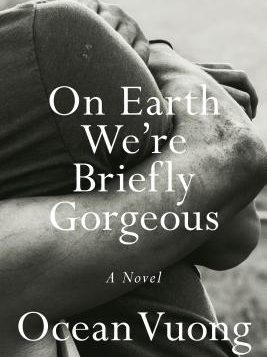 On Earth We’re Briefly Gorgeous
On Earth We’re Briefly Gorgeous
by Ocean Vuong
Penguin Press. 246 pages, $26.
“I’M NOT telling you a story so much as a shipwreck,” the narrator of Ocean Vuong’s magnificent debut novel declares. That shipwreck—“pieces floating, finally legible”—is the painful and fragmentary story of a Vietnamese-American boy trying to find his way in an alien world.
Couched as a letter to his mother, the narrator, Little Dog, sets out to examine what it means to be a survivor. His family has been traumatized by war, dislocation, shame, brokenness, and abuse. The mother, the war “still inside” her, suffers from PTSD and terrible nightmares. “Your mom, She not normal okay?” the grandmother, who herself shows signs of schizophrenia, tells him: “She hurt … sick like me. In the brains.”
Piecemeal, we learn the painful backstory of both women in Little Dog’s life, a story that includes an unhappy arranged marriage, prostitution, and abandonment. The mother, half-white, is taunted for being a “ghost-girl”; the grandmother is branded a traitor for sleeping with the enemy. Once they emigrate to America, the family speaks “only partially in Vietnamese, but entirely in war.” Survival, physical and psychic, is their main pursuit.
Alone with his pain and isolation, Little Dog—“a gaping wound in the middle of America”—searches for “what it means to be awake in American bones.” Threatened with the anonymity that poverty and immigrant status impose on people in this country, he sets out to stem the tide of erasure, to choose memory over oblivion. “I’m breaking us apart again,” he tells his mother, “so that I might carry us somewhere else—where, exactly, I’m not sure. Just as I don’t know what to call you—White, Asian, orphan, American, mother?”
In the summer of 2003, at the age of fourteen, Little Dog gets a job working on a tobacco farm outside of Hartford. There he meets Trevor, a teenager full of “knuckled American rage.” Trevor, too, lives in a family full of pain, in a house “colored with exhaustion, disrepair.” The two boys hit it off. Little Dog—who has been taught to be invisible in order to be safe, “seldom been seen by anyone”—suddenly feels seen by his new friend. “I wanted it,” he writes, “for his gaze to fix me to the world I felt only halfway inside of.” The combination of danger, eroticism, and tenderness that Trevor offers him is intoxicating: “That’s what I wanted,” Little Dog confesses, “not merely the body, desirable as it was, but its will to grow into the very world that rejects its hunger.” The attraction becomes sexual, an experience that allows Little Dog to see himself for the first time as beautiful.
Vuong reveals a prodigious talent for description and the evocation of psychological and emotional realities. He is equally adept at describing the awkward beauty of teenage sex, the gritty poverty of working-class Hartford, the cadence of pidgin English, or the terrors that refugees face. While Vuong occasionally strains after a metaphor or goes for a weighty observation that seems unwarranted, for the most part his prose is gorgeous, at once lapidary and incantatory, finely chiseled and poetically spellbinding, an angry scream and a tender whisper.
As he did in his first book of poems, Night Sky with Exit Wounds, Vuong takes enormous risks in this novel; he does not play it safe. More often than not, that strategy pays off enormously. “The rules, like streets, can only take you to known places. Underneath the grid is a field—it was always there—where to be lost is never to be wrong, but simply more.”
When he is seventeen, Little Dog confesses to his mother that he likes boys. “Are you going to wear a dress now?” she asks. “They kill people for wearing dresses.” And then she reveals to him a heartbreaking secret of her own. This is a novel haunted by phantoms and ghosts who flicker in and out, threatening to upend whatever tenuous stability Little Dog thinks he has achieved. The story proceeds less along a formal narrative line than along the meandering paths of memory itself. Fragmentary images and partial stories appear and depart until they eventually coalesce into a powerful, often harrowing, tale of survival, resilience, and fragile beauty.
This is also a novel about Little Dog’s journey toward becoming a writer. (The parallels with the author’s own journey are unmistakable.) “When I first started writing,” he tells his mother, “I hated myself for being so uncertain, about images, clauses, ideas, even the pen or journal I used. Everything I wrote began with maybe and perhaps, and ended with I think or I believe. But my doubt is everywhere, Ma. Even when I know something to be true as bone I fear the knowledge will dissolve, will not, despite my writing it, stay real.”
Keeping it real—naming painful experiences and memories—defines Little Dog’s quest. While others in his life numb their pain with alcohol, drugs, or brutality toward others, Little Dog holds on to the notion that telling the truth, finding language to speak the truth, will ultimately liberate him from fear and torment. “Without a name, things get lost,” he observes. This is a novel about making sure things—no matter how painful—do not get lost, that, as he puts it in one of his poems, “by pressing/ this pen to paper, I was touching us/ back from extinction.”
At one point in the novel, the mother says to her son: “You have to find a way, Little Dog. You have a bellyful of English. You have to use it, okay?” With this novel, Ocean Vuong beautifully demonstrates that he can use his bellyful of English to marvelous ends. As harrowing as Little Dog’s story is, ultimately On Earth We’re Briefly Gorgeous rises to the level of affirmation: “I told myself we were born from war—but I was wrong, Ma. We were born from beauty.”
The novel’s title comes from the title of one of Vuong’s poems. In that poem, he writes: “Say yes. Say yes/ anyway.” Likewise here, in his astonishing love letter to life, Vuong affirms again and again that “the heart’s task of saying yes yes yes.” Anyway. No matter what.
Philip Gambone, a regular contributor to this magazine, has taught in Vietnam and worked with Vietnamese students in the U.S.






